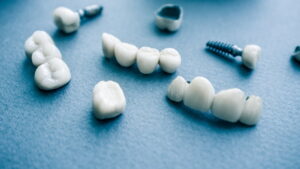When it comes to replacing missing teeth, there are several options available, with dental implants and traditional dentures being two of the most popular. While traditional dentures have been a go-to solution for many years, dental implants offer several benefits that make them a superior choice. In this blog post, we will explore the advantages of dental implants over traditional dentures.
1. The Natural and Comfortable Experience of Dental Implants:
First and foremost, dental implants provide a more natural and comfortable experience. Unlike dentures, which sit on the gums and can slip or shift during eating or speaking, dental implants are surgically placed in the jawbone, essentially becoming a part of your mouth. This secure placement ensures that the implants remain in place, eliminating embarrassing situations and giving you the confidence to speak and eat without any worries.
2. The Durability of Dental Implants:
Another significant advantage of dental implants is their durability. While dentures may last for several years, they usually need to be replaced or relined due to wear and tear. On the other hand, dental implants are designed to last a lifetime with proper care. Made from biocompatible materials like titanium, implants fuse with the jawbone, creating a sturdy foundation for artificial teeth. This ensures that your replacement teeth are strong, stable, and long-lasting, allowing you to enjoy your favorite foods without any restrictions.
3. Improved Oral Health with Dental Implants:
Furthermore, dental implants offer improved oral health compared to traditional dentures. When a tooth is missing, the underlying jawbone tends to deteriorate over time. Dental implants stimulate the jawbone just like natural teeth, preventing bone loss and maintaining the integrity of your facial structure. In contrast, dentures do not stimulate the jawbone, which can lead to bone resorption, facial sagging, and a prematurely aged appearance. By choosing dental implants, you can preserve your jawbone and maintain a youthful facial structure for years to come.
4. Preserving Surrounding Teeth with Dental Implants:
Another benefit of dental implants is their ability to maintain the health of surrounding teeth. Unlike traditional dentures, which rely on neighboring teeth for support, dental implants are standalone replacements that do not require any support from adjacent teeth. This means that your natural teeth remain unaffected, minimizing the risk of decay or damage to healthy teeth.
5. The Convenience of Dental Implants Regenerate Response:
Last but not least, dental implants provide unparalleled convenience. Unlike dentures, which require daily removal, cleaning, and the use of adhesives, dental implants can be cared for just like natural teeth. Regular brushing, flossing, and routine dental check-ups are all that is needed to maintain the health and longevity of your dental implants.
In conclusion, dental implants offer several advantages over traditional dentures, including a more natural feel, increased durability, improved oral health, preservation of surrounding teeth, and enhanced convenience. Although dental implants require a surgical procedure and a longer treatment time compared to dentures, their long-term benefits make them an excellent investment in your oral health and overall well-being. If you are considering tooth replacement options, consult with your dentist today to determine if dental implants are the right choice for you.




